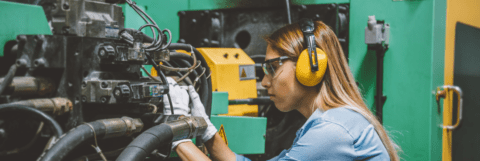High-tech mobility is already a $300+ billion – and growing – industry in Michigan. Today, it draws on over a quarter of our private-sector workforce. The shift away from traditional automotive manufacturing is part of an unstoppable and accelerating digital-industrial revolution that, for Michigan, is both rich in opportunity and fraught with peril. Automobiles have evolved into rolling computers, and many new vehicles sit idle awaiting chips, not pistons. To win, we must truly become a high-tech state.
EDUCATION MUST BE JUST-IN-TIME, PROJECT-SPECIFIC PREPARATION
Today’s technology skills are perishable, but the needs of the mobility industry are not. To “secure our spot,” we must become a full participant in today’s much more fluid, vast, and rapidly evolving digital talent ecosystem. To produce irresistible talent, our academic institutions must pivot toward working more directly with industry while providing a lean education focused on just-in-time, project-specific preparation. We must place less emphasis on degrees and more on competency and establish a wide variety of non-traditional partnerships across institutions.
Industry is already engaged. According to findings by Capgemini Research, nearly 70% of manufacturers had smart factory initiatives in place in 2019, up from 43% only two years before. Smart factories, though, are only the tip of the high-tech iceberg; the larger part includes a constellation of technologies related to autonomy, semiconductors, the cloud, connectivity, big data, AI, and advanced analytics, each of which have spawned a vast array of sub-specialties.
Ironically, at the core of our challenge is our prior success: our traditional pre-eminence in automotive manufacturing and engineering education. The automotive background of our colleges and universities pre-positions us to lead in mobility, but it can also make us dangerously comfortable – and we are often failing to respond with appropriate urgency – or creativity – to the workforce needs of the Industry 4.0 economy.
MOBILITY GRADUATES WILL LOOK ELSEWHERE, TAKING 1000S OF GOOD JOBS WITH THEM
States like California, North Carolina, Texas, Georgia, and Massachusetts have long been serious high-tech players and are very skilled at attracting, and producing, the best talent. Michigan now competes with these states in developing its high-tech workforce. Gone are the days when all the best engineers aspired to come to Michigan. Technology professionals now have many options outside the state, as do our own graduates.
So, if we do not adapt… if we do not find ways to recruit and produce the nation’s best digital workforce… if we lose the competition for digital talent, we will reduce the Michigan economy to relying on the holdover elements of an industry that is being rapidly replaced. People wanting to work in the exploding mobility industry will gravitate to competing states. With them will go thousands of high-tech jobs, with an average compensation at $65,000 compared to just under $30,000 for all other jobs. And with them will also go a powerful engine of future economic growth and prosperity for our state.
Michigan is poised to compete and win. We would, however, do well to heed the words of the Red Queen in Alice in Wonderland. “My dear,” she said to Alice, “here we must run as fast as we can, just to stay in place. And if you wish to go anywhere you must run twice as fast as that.”


